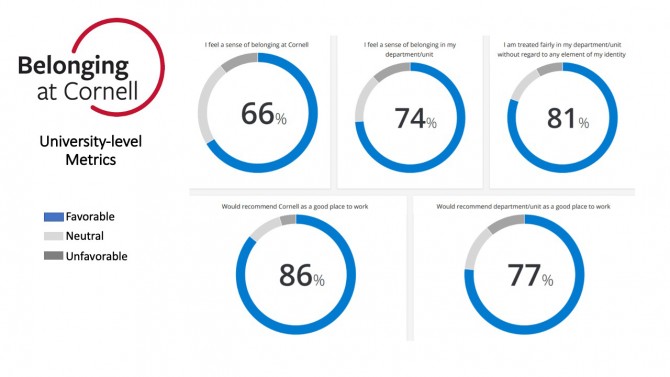‘Belonging at Cornell’ survey to inform diversity action plans
By Susan Kelley
Results from a survey of Cornell faculty and staff are giving colleges and units a better understanding of how to make diversity and inclusion thrive on campus.
The Belonging at Cornell survey, sent in early February to faculty and staff on the Ithaca, Geneva and Cornell Tech campuses, asked about their sense of belonging, fair treatment, willingness to recommend Cornell and experience with marginalizing behaviors. It is part of the Belonging at Cornell initiative, the university’s guiding framework designed to continue the progress toward making Cornell a more diverse and inclusive environment.
“This data will serve as a baseline, and will help inform and guide the work we do together to support our diversity, equity and inclusion objectives,” said Avery August, Ph.D. ’94, vice provost for academic affairs, who chairs the leadership group Presidential Advisors on Diversity and Equity (PADE). “Our mission is to focus our collective efforts on creating a campus community where individuals from diverse backgrounds and life experiences can both contribute and thrive.”
The other presidential advisers are Angela Winfield, J.D. ’08, associate vice president for inclusion and workforce diversity; and Vijay Pendakur, the Robert W. and Elizabeth C. Staley Dean of Students. They are joined by Victoria White, project leader in the Office of the President, who helps facilitate and implement Belonging at Cornell strategies.
About 45% of Cornell faculty and staff responded to the survey, with 5,413 responses. While results varied across colleges and units, most respondents said they feel they belong at Cornell.
Among those who responded, 86% would recommend Cornell as a good place to work, and 77% would recommend their department as a good place to work. About two in three survey participants, 66%, responded favorably to the statement, “I feel a sense of belonging at Cornell,” with department-level sense of belonging and sense of fair treatment both slightly higher.
However, some key takeaways suggest opportunities for improvement, particularly for those who experienced or witnessed marginalizing behavior in the past year and those with concerns about the distribution of workloads.
About 25% of respondents said they had observed or believe that they have observed a discriminatory or harassing event or behavior in their department or unit; likewise 25% said they felt marginalized in their department or unit due to an element of their personal identity.
Among respondents who reported feeling set apart and/or marginalized in their department or unit in the past year, the top three reasons were: due to their age, a group that included both younger and older employees; due to their gender; and due to their race/ethnicity.
The lowest percentage of favorable responses on the survey had to do with distribution of workload, where only 55% reported feeling that “workloads are distributed fairly in my department/unit.”
Belonging at Cornell leaders in each college and unit have received the survey results pertaining to their organizations, as well as a toolkit of suggested actions and initiatives that they can use to create targeted action plans to address areas that fall below the Cornell-wide average.
“These survey results are specific to each college and unit,” Winfield said. “The design of the survey and toolkit allow college and unit administrators to hone in on specific areas of challenge and develop solutions tailored to their situations.”
For example, if a college discovers that a high number of faculty or staff feel their expertise and skills are not valued, college administrators can conduct an audit of recognition and award programs to ensure each step of the process – from the selection criteria to the nomination and evaluation – are inclusive and equitable.
Grant opportunity
In addition to the toolkit, the presidential advisers have established two grants of up to $20,000 apiece for faculty, staff and students to create programs for the spring 2021 semester that continue the progress toward making Cornell a more diverse and inclusive environment.
Proposals must be submitted via email by Oct. 30; grant winners are expected to be announced in early December.
The grant committee will give priority to proposals that align with institution-wide objectives of improving the Cornell experience for students, faculty and staff, and those that foster a sense of belonging, promote fair treatment and support the environment of Cornell as a great place to study and work.
“We encourage exciting and innovative proposals that include collaboration across colleges and units, and promise to drive sustained impact to the Cornell community,” Pendakur said. “We want to fund projects that are meaningful, so folks can put something in place that has a profound and lasting impact.”
Belonging at Cornell builds on the work of the Presidential Task Force on Campus Climate and the Provost’s Task Force to Enhance Faculty Diversity.
Media Contact
Get Cornell news delivered right to your inbox.
Subscribe

